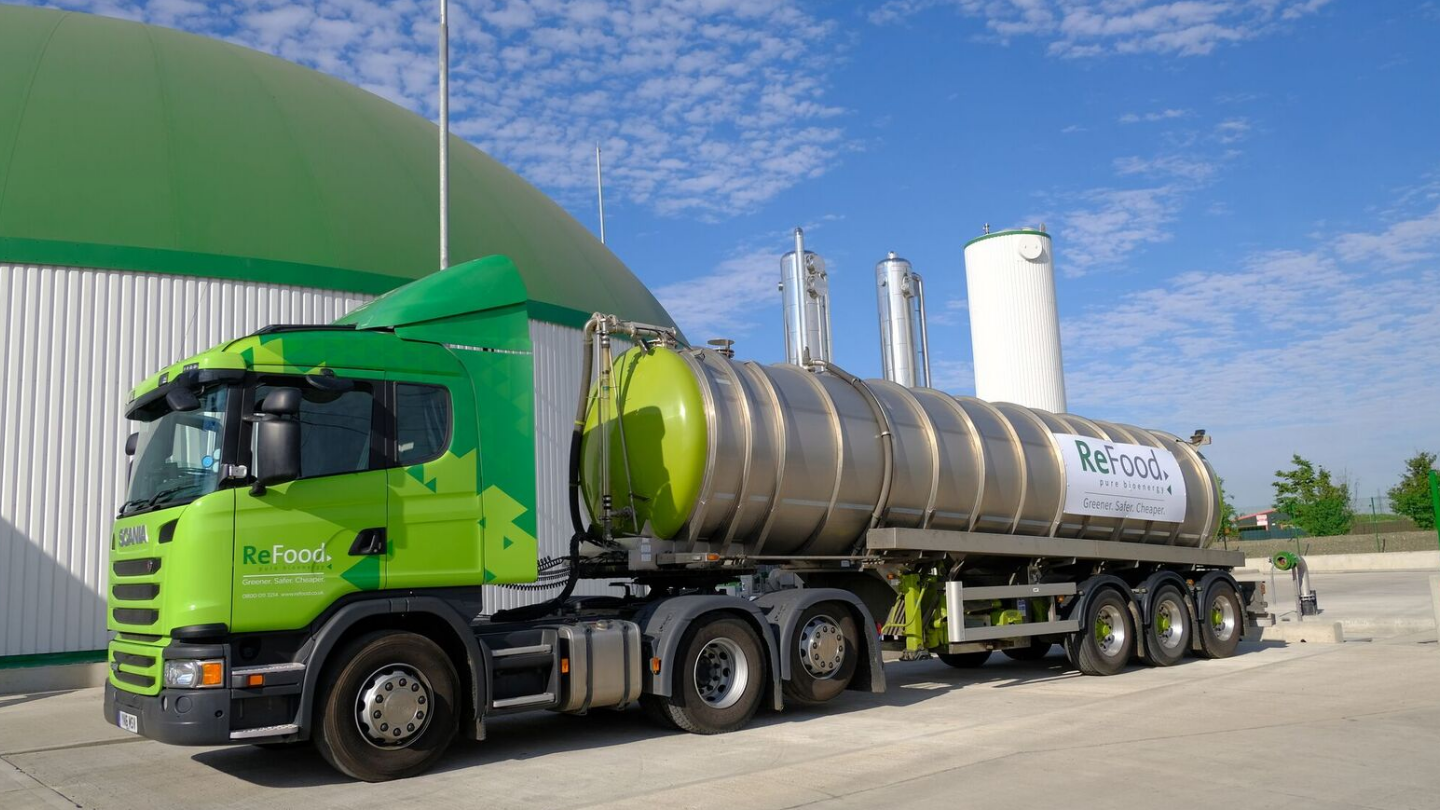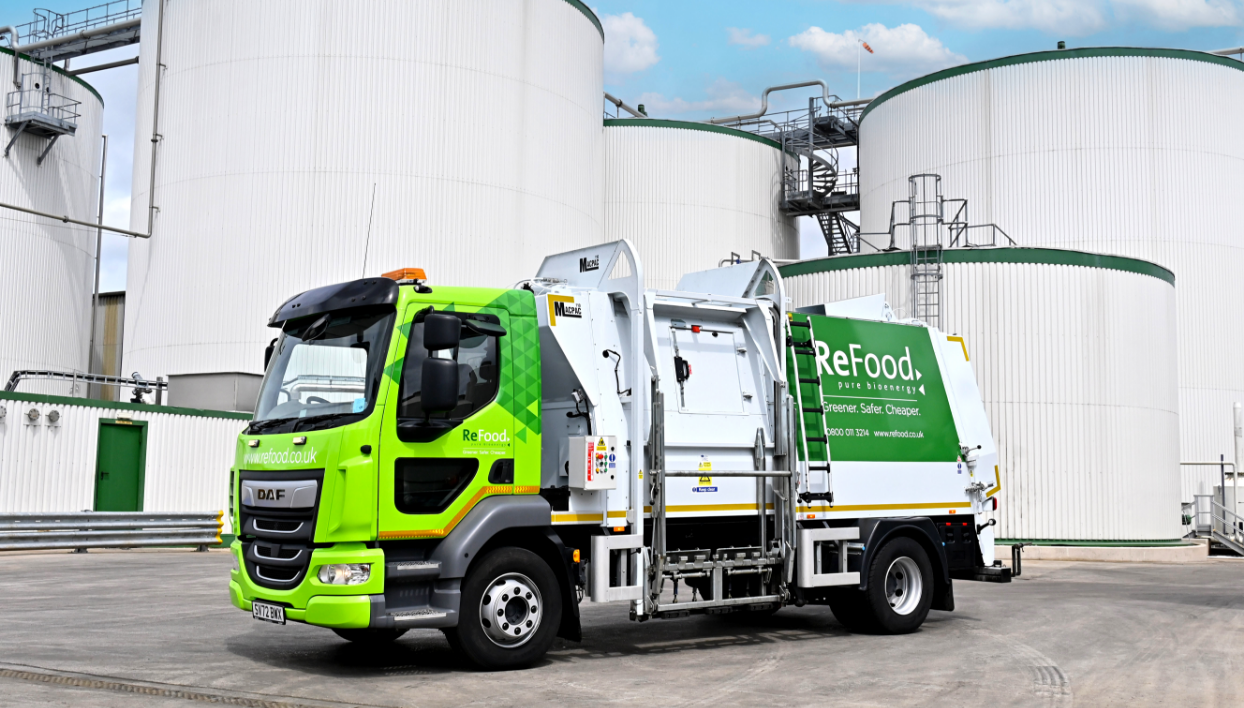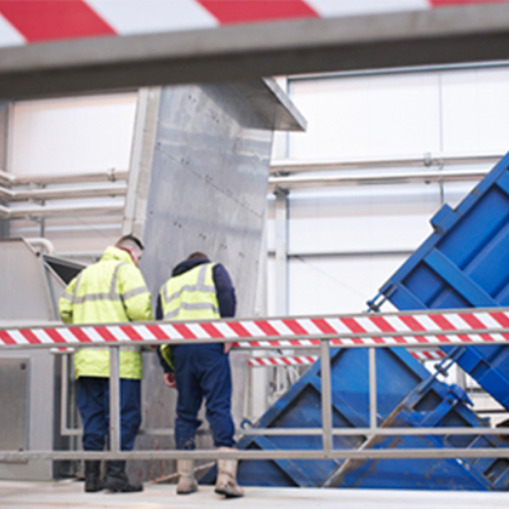
Proven to work across Europe, our technology converts unwanted waste into renewable energy, which our London and Widnes plants supply direct to the National Gas Grid, and ReGrow, our PAS110 accredited nutrient-rich biofertiliser. ReGrow is an excellent supplement for enhancing soil health and fertility, making it great for food crops.
Food waste recycling with ReFood is the perfect way to lower your company’s carbon footprint and costs. And our end-to-end service gives peace of mind that you’re disposing of food waste in the most sustainable way.
It’s the closed-loop process that keeps on giving.
-
01 CollectionsReFood collections are tailored to your business. Our standard collection service provides you with free 240 litre food waste bins (larger versions are available) to meet your needs. However, we can also take waste in other ways:
- From caddies and standard bin liners
- Directly from your kitchen's 'dirty area' Pallet boxes (Dolavs)
- Bulk loader
- Palletised
- Liquid tanker waste
- RCVs
- IBCs
- Skips and roll-on/roll-off containers
-
02 Dedicated fleet schedulesOur dedicated fleet schedules waste collections to your timetable, from daily to ad hoc. Round Optimisation software ensures collections are reliable and environmentally friendly.
-
03 Bin replacementInstead of emptying bins on site, we replace them with sanitised ones to meet the highest level of biosecurity and save you the cost of maintaining them yourself.
-
04 Year round serviceOpen all year round, our secure plant separates any packaging, and then uses AD technology to recycle the food waste into renewable energy and biofertiliser.

Anaerobic Digestion is a natural process that biologically breaks down organic material to generate large amounts of biogas – a combination of methane and carbon dioxide. It works in a similar way to a compost heap, only on an industrial scale. And, because of the lack of oxygen, we’re able to capture the biogas, rather than lose it to the atmosphere.
-
01 Food waste pre-treatmentAll food waste is placed into hoppers, which act as large mixing vessels, and is then assigned to depacking - a process that separates packaging from organic waste. Recovered plastics are cleaned and used to create refuse-derived fuels. Then, liquid is added to the remaining waste so it can be pumped.
-
02 HeatingAll food waste is passed through a heat exchanger and then warmed to 70°C.
-
03 PasteurisationThe waste is held at 70°C for one hour to comply with ABP regulations.
-
04 CoolingThe pasteurised waste is cooled naturally by channelling it to run alongside the cold, incoming material, which lowers its temperature to approximately 40°C.
-
05 MixingThe organic waste is moved to a mixing tank and held for three days to ensure a smooth product gets transferred to the digestors.
-
06 DigestersEach digester tank is filled with 3,500 tonnes of blended organic material. Over the next 30 to 35 days, it is broken down by bacteria to produce methane.
-
07 Gas collectionGas is collected from the top of the digesters and passed through a biological scrubber to remove any hydrogen sulphide molecules before moving onto the final stages of production.
-
08 Screening, storage and dispatchThe biogas is kept in storage tanks until required. It is then pre-conditioned, cooled and pressurised before being sent for processing. At our Doncaster plant, the gas is used to fuel large industrial-scale combined heat & power engines, the electricity generated is delivered directly to the National Grid – enough energy to power 10,000 homes per year. The heat produced by the engines is used to produce hot water and steam for the process and the pasteurisation of the raw food waste. At our London and Widnes plants, the biogas undergoes a further refining process to remove carbon dioxide and volatile organic compounds. Once the gas has completed the refining process an odorant is added to the biomethane before it is pumped directly into the National Gas Grid. The process produces enough gas to supply up to 12,600 homes per year. Once the biogas process has been completed the remaining liquid is transformed into our ReGrow bio-fertiliser for local farming and agricultural use.

At our Doncaster plant, the gas is used to fuel large industrial-scale combined heat & power engines, the electricity generated is delivered directly to the National Grid – enough energy to power 10,000 homes per year. The heat produced by the engines is used to produce hot water and steam for the process and the pasteurisation of the raw food waste.
At our London and Widnes plants, the biogas undergoes a further refining process to remove carbon dioxide and volatile organic compounds. Once the gas has completed the refining process an odorant is added to the biomethane before it is pumped directly into the National Gas Grid. The process produces enough gas to supply up to 12,600 homes per year.
Once the biogas process has been completed the remaining liquid is transformed into our ReGrow bio-fertiliser for local farming and agricultural use.
We use the UK’s most advanced Anaerobic Digestion technology to provide an end-to-end recycling process that creates renewable energy and fertiliser from waste.
Placement of recycling bins
We provide our customers with a choice of recycling bins to store their food waste. These are available in 240 litre wheeled bins with optional larger containers if needed.
Food waste collection
Recycling bins are collected to a bespoke schedule by our own fleet of liveried trucks and taken to our Anaerobic Digestion (AD) plant. All bins taken are replaced by fresh, sanitised ones to ensure the highest levels of hygiene are maintained at all times.
Recycling at our plant
On arrival at our plant, food waste is separated from any packaging. Then, using the AD process, organic matter is biologically broken down in an oxygen-free environment. During this process large amounts of heat and biogas is generated which is made up of methane and carbon dioxide.
Production of renewable energy
All our facilities are powered by heat and steam generated by renewable energy – not fossil fuels. Our London and Widnes plants export renewable energy directly to the National Grid and our Doncaster site uses its own renewable energy.
Meanwhile, our environmentally friendly, nutrient-rich biofertiliser is sold to local farmers and growers. ReGrow directly displaces fossil fuel-based fertiliser, maintains the PAS110 quality protocol accreditation and upholds an exceptional level of quality and safety.
Our broad range of food waste solutions means we can recycle all food waste matter at any stage of the food chain.
- Kitchen and food waste
- Drink waste
- Non-packaged food waste
- Food waste in packaging
- Drink waste in packaging
- Bread and bakery products
- Fruit and vegetables
- Residues from food production
- Liquid waste
- Household food waste
- Bones, fat and meat
- Other organic residues from food producing industries
- Non-food or drink waste
- Empty packaging
- Hazardous waste
- Cleaning or laundry products
- Glassware
- General waste
- Floor sweeping
